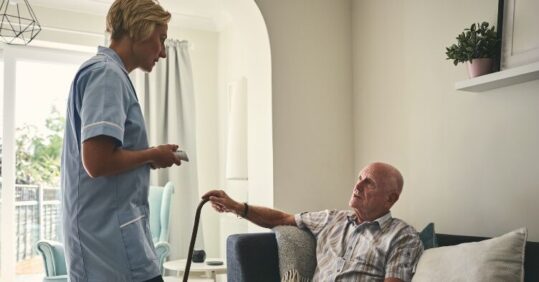End-of-life care inconsistent amid ‘stretched’ community services, research finds

Terminally ill people cannot access the care they need in the evenings and weekends in many parts of the country, with much out-of-hours end-of-life care relying on ‘stretched’ community services, according to research led by King’s College London.
A new study has revealed significant variations in end-of-life care across the UK, with many patients struggling to access the out-of-hours care they need and people who may wish to remain at home being taken into hospital.
In 80% of the areas surveyed, specialist palliative nurse visits are not provided overnight. However, in 73% of areas surveyed, this service was available during weekends and bank holidays.
Related Article: Lower stroke survival odds faced by people in poorer areas
The research was funded by Marie Curie and published in their Better End of Life report.
The National Institute for Health and Care Excellence (NICE) recommends that services are in place to support adults approaching the end of their life and their carers, 24 hours a day, seven days a week. This includes a designated telephone line which can connect them quickly and easily to local services.
Accessing vital medicines out-of-hours was also difficult, with only a quarter of areas having a pharmacy open throughout the night.
The report also advised: ‘District nurses and community nursing teams play an extensive role in providing hands-on out-of-hours care, but huge pressures on this workforce limit the care they can provide; improved workforce planning, provision, and support for community providers of out -of-hours palliative and end of life care is essential.’
Related Article: Action needed to tackle untreated hearing loss in care homes
Professor Katherine Sleeman, lead researcher on the project from King’s College London, said: ‘Our research uncovers considerable variation in the care and services that are provided in the evening or at weekends across the UK. If these services are not in place, people may have no choice but to go to hospital, even if their preference is to stay at home.’
The researchers looked at hospital visits over a year and found approximately 780 000 out-of-hours hospital visits were made to accident and emergency departments. The frequency of these visits increased rapidly during the last three months of a person’s life and were higher for people in areas of social deprivation.
Professor Sleeman added: ‘Because we know that demand for palliative and end-of-life care will increase over the next decade, it is essential that the gaps in services out-of-hours are addressed so that everyone with advanced illness has access to the right care, whenever and wherever they need it.’
The report recommends that every area in the UK should have a designated 24/7 palliative and end-of-life care telephone line so that people at the end of life and their carers can access local services and medication and get the advice and support they need.
Related Article: ‘Alarming’ health inequalities between older people in the North and South of England

See how our symptom tool can help you make better sense of patient presentations
Click here to search a symptom




